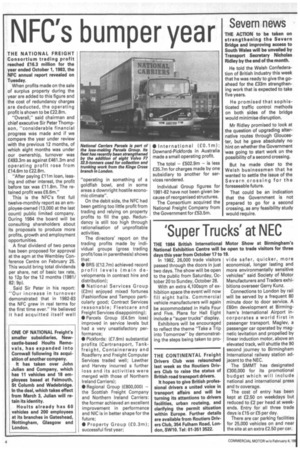NFC's bumper year
Page 6

If you've noticed an error in this article please click here to report it so we can fix it.
THE NATIONAL FREIGHT Consortium trading profit reached £16.3 million for the year ended October 1, 1983, the NFC annual report revealed on Tuesday.
When profits made on the sale of surplus property during the year are added to this figure and the cost of redundancy charges are deducted, the operating profit is shown to be £22.8m.
"Overall," said chairman and chief executive Sir Peter Thompson, "considerable financial progress was made and if we compare the year under review with the previous 12 months, of which eight months was under our ownership, turnover was £493.3m as against £461.3m and operating profit rose from £14.6m to £22.8m.
"After paying £11m loan, leasing and other interest, the profit before tax was £11.8m. The retained profit was £6.6m."
This is the NFC's first full twelve-monthly report as an employee-owned (13,000 at the last count) public limited company. During 1984 the board will be consulting shareholders about its proposals to produce more profits, growth and employment opportunities.
A final dividend of two pence has been proposed for approval at the agm at the Wembley Conference Centre on February 25. This would bring total dividends per share, net of basic tax rate, to 12p for the 12 months (1981/ 82: 9p).
Said Sir Peter in his report: "Our increase in turnover demonstrated that in 1982-83 the NFC grew in real terms for the first time ever." He believed it had acquitted itself well "operating in something of a goldfish bowl, and in some areas a downright hostile economic climate".
On the debit side, the NEC had been getting too little profit from trading and relying on property profits to fill the gap. Redundancy is still too high through rationalisation of unprofitable activities.
The directors' report on the trading profits made by individual groups (gross trading profit/loss in parenthesis) shows that: • BRS (£12,7m) achieved record profit levels (main de velopments in contract hire and distribution); • National Services Group (£2m) enjoyed mixed fortunes (Fashionflow and Tempco particularly good; Contract Services reasonable; Fleetcare and Freight Services disappointing); • Parcels Group (£4.5m loss) improved in service levels but had a very unsatisfactory performance; • Pickfords: (£7.9m) substantial profits (Cartransport, Tankfreight, Containerway and Roadferry and Freight Computer Services traded well; Lawther and Harvey incurred a further loss and its activities were merged with those of Northern Ireland Carriers); • Regional Group (£800,000) — the Scottish Freight Company and Northern Ireland Carriers: the former achieved an excellent improvement in performance and NIC is in better shape for the future; • Property Group (£0.3m); successful first year; • International (£0.1 m): Downard-Pickfords in Australia made a small operating profit.
The total — £502.9m — is less £35.7m for charges made by one subsidiary to another for services rendered.
Individual Group figures for 1981-82 have not been given because of reorganised structures.
The Consortium acquired the National Freight Company from the Government for £53.5m.
































































































